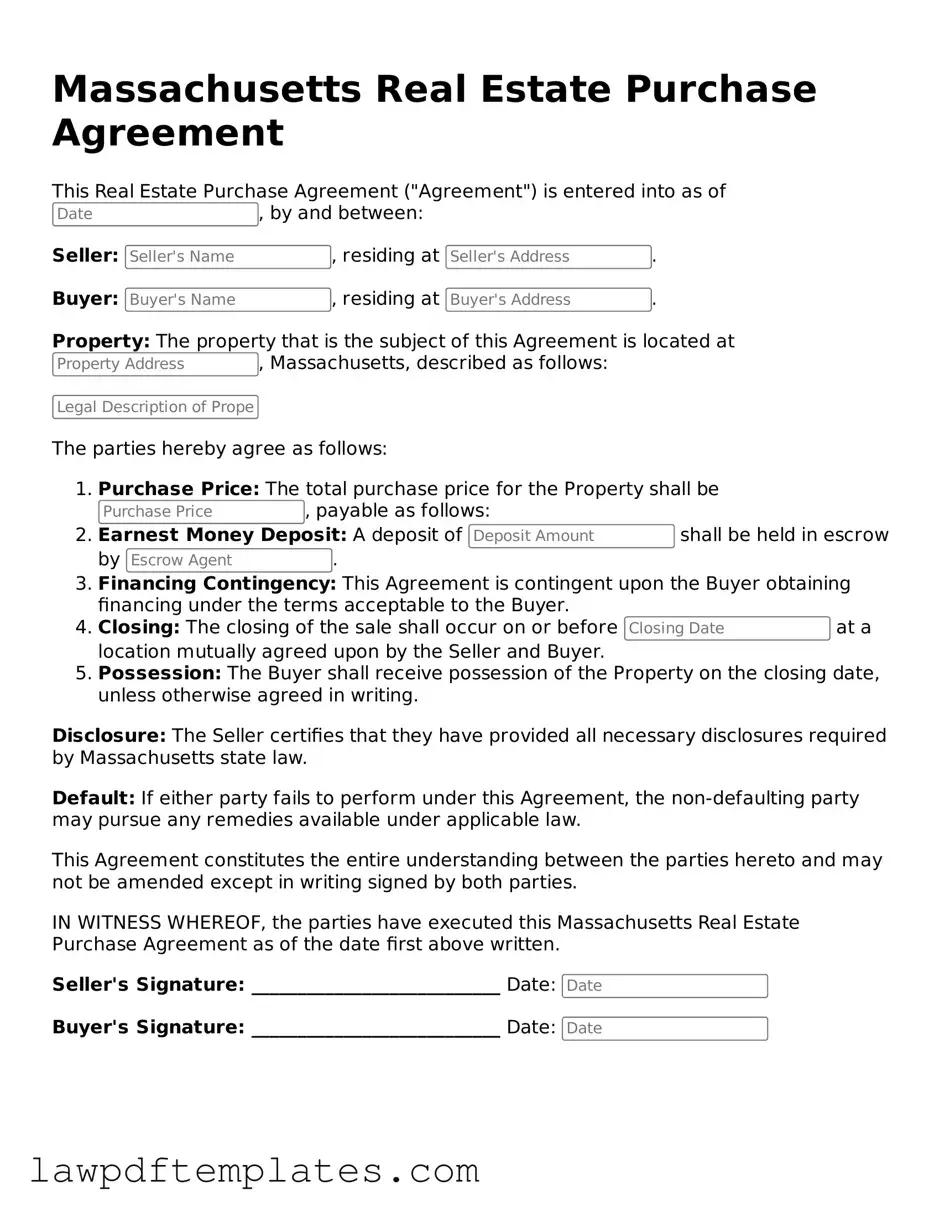Free Real Estate Purchase Agreement Template for the State of Massachusetts
Form Breakdown
| Fact Name | Details |
|---|---|
| Governing Law | The Massachusetts Real Estate Purchase Agreement is governed by Massachusetts General Laws Chapter 183 and Chapter 254. |
| Purpose | This form outlines the terms and conditions for the sale of real estate in Massachusetts. |
| Parties Involved | The agreement typically includes the buyer and seller, along with their respective agents. |
| Property Description | A detailed description of the property being sold is required, including the address and legal description. |
| Purchase Price | The form specifies the total purchase price and any deposit amount that is required. |
| Contingencies | Common contingencies may include financing, inspections, and appraisal conditions. |
| Closing Date | The agreement should state the expected closing date for the transaction. |
| Default Provisions | It outlines the actions that can be taken if either party defaults on the agreement. |
| Signatures | Both parties must sign the agreement for it to be legally binding. |
Sample - Massachusetts Real Estate Purchase Agreement Form
Massachusetts Real Estate Purchase Agreement
This Real Estate Purchase Agreement ("Agreement") is entered into as of , by and between:
Seller: , residing at .
Buyer: , residing at .
Property: The property that is the subject of this Agreement is located at , Massachusetts, described as follows:
The parties hereby agree as follows:
- Purchase Price: The total purchase price for the Property shall be , payable as follows:
- Earnest Money Deposit: A deposit of shall be held in escrow by .
- Financing Contingency: This Agreement is contingent upon the Buyer obtaining financing under the terms acceptable to the Buyer.
- Closing: The closing of the sale shall occur on or before at a location mutually agreed upon by the Seller and Buyer.
- Possession: The Buyer shall receive possession of the Property on the closing date, unless otherwise agreed in writing.
Disclosure: The Seller certifies that they have provided all necessary disclosures required by Massachusetts state law.
Default: If either party fails to perform under this Agreement, the non-defaulting party may pursue any remedies available under applicable law.
This Agreement constitutes the entire understanding between the parties hereto and may not be amended except in writing signed by both parties.
IN WITNESS WHEREOF, the parties have executed this Massachusetts Real Estate Purchase Agreement as of the date first above written.
Seller's Signature: ___________________________ Date:
Buyer's Signature: ___________________________ Date:
Common mistakes
Filling out the Massachusetts Real Estate Purchase Agreement can be a complex task. Many individuals make common mistakes that can lead to delays or complications in the transaction process. One significant error is failing to include all necessary parties in the agreement. It's crucial to ensure that all buyers and sellers are listed correctly. Omitting a party can lead to disputes and may even invalidate the agreement.
Another common mistake is not specifying the purchase price clearly. Buyers should ensure that the amount is stated accurately and that any contingencies affecting the price are detailed. Ambiguities in this section can create confusion and may lead to disagreements later on.
People often overlook the importance of including all relevant terms and conditions. This includes details about financing, inspections, and closing dates. Without these specifics, the agreement may lack clarity, leaving room for misunderstandings. Clear terms help all parties know their responsibilities and expectations.
Additionally, many individuals fail to review the property description thoroughly. It is essential to provide an accurate and complete description of the property being sold. This includes the address and any relevant parcel numbers. Errors in this section can lead to legal issues or disputes about the property boundaries.
Another mistake is neglecting to include contingencies. Contingencies protect buyers and sellers by allowing them to back out of the agreement under certain conditions, such as failing to secure financing or issues arising from inspections. Without these clauses, parties may find themselves locked into a deal that no longer works for them.
Lastly, many people forget to sign the agreement or have the necessary parties sign it. A signed document is crucial for it to be legally binding. Without signatures, the agreement holds no weight, and the transaction cannot proceed. It’s important to double-check that all required signatures are in place before submitting the document.
Discover More Real Estate Purchase Agreement Templates for Specific States
Purchase Contract for Home - It sets forth the rights of repair for buyers regarding pre-existing issues discovered during inspections.
Free Nc Real Estate Purchase Agreement - Addresses any environmental disclosures pertinent to the property.
In addition to serving as a proof of purchase, the Texas RV Bill of Sale can be easily obtained online, allowing both buyers and sellers to streamline their transactions; for those interested, more information can be found at PDF Documents Hub.
Midland Title Toledo - Defines the process for handling the title transfer during closing.
